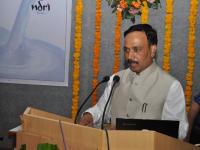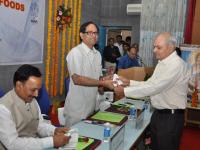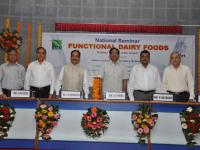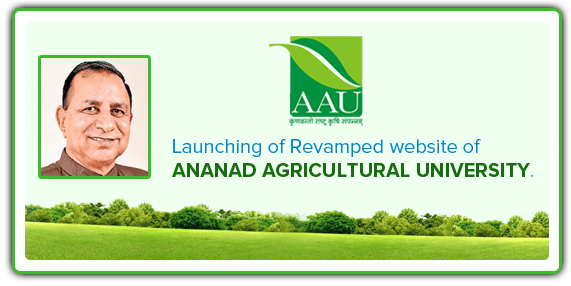Search
Latest News
National Seminar on "Functional Dairy Foods"
National Academy of Dairy Science (NADS), India and SMC College of Dairy Science, Anand Agricultural University, Anand jointly organized national seminar on Functional Dairy Foods at AAU, Anand on 11th October, 2014.
NADS (I) was established on 26th May, 2010 with its headquarters at National Dairy Research Institute (NDRI), Karnal. The mission of the academy is to achieve the status of council for providing views on policy issues, thus to be instrumental in the growth of dairy industry and nations economy. SMC College of Dairy Science, a pioneer institute in dairy education, in addition to producing dairy professionals with academic excellence and technical skills, also provides R& D support to dairy and food industries. About 150 delegates from dairy industry and academic institutions from different parts of the country took part in the seminar. The event was sponsored by Danisco-DuPont, Singapore.
Inaugural Session
The inaugural session was graced by many dignitaries. Dr. B. P. Shah, Principal & Dean SMC College of Dairy Science, in his welcome address highlighted the promising health benefits offered by functional foods. As a tribute to Mahatma Gandhi and honouring the words of our Prime Minister, Shri NarendrabhaiModi, all the dignitaries and the fellows of the academy were felicitated with khadi handkerchief alongwith the fragrance of flowers. Dr. G. R. Patil, Vice president, NADS(I) and Joint Director (Academic) NDRI, Karnal briefed on various activities of NADSI and the relevance of the functional foods. Major objectives of the academy are to encourage and promote the pursuit of excellence in the field of dairy science, to promote scientific and technological knowledge in dairying and also to act as a body to promote the work of eminent scientists and technologists of the country. He also added that the demand for functional foods is growing at the rate of 8 to 14% and suggested that traditional wisdom of Ayurveda and modern knowledge of Dairy Technology should be shared to develop new functional foods for the consumers.
Dr. K. Rathnam, Managing Director, Amul Dairy Anand, expressed his view on the relevance of functional foods in the present and future market. Functional food is one of the fastest growing food segment, highly established in western markets and its importance is increasing because lot of research findings are now indicating their role in control of life style diseases. About one third of the Indian population suffers from one or other kind of life style disease, which requires different dimensions of treatment. Functional foods helps to cure as well as prevent occurrence of such diseases. He also remarked that regulations on functional foods and food ingredients as well as health claims should be streamlined.
Dr. N. C. Patel, Vice Chancellor, Anand Agricultural University, Anand, Chairman of inaugural function informed that the term ‘functional food’ was introduced in Japan in mid 1980s for food products fortified with special constituents that possess advantageous physiological effects beyond the basic nutrition. There is a scientific challenge to build an in-depth knowledge about various aspects related to the process of fermentation, functional ingredients and their proper selection, processing technologies, clinical safety of the newly developed functional foods etc. He also emphasised on use of a drum stick. It is a common vegetable with plenty of nutrients and its potential can be harnessed. Milk is deficient in iron, while drum stick is full of iron and hence a product like drum stick dahi or icecream can be a preferred choice.
Dr. A. K. Srivastava, President, NADS (I) and Director & Vice Chancellor, NDRI, Karnal, in his presidential address said that in present scenario our prime motto and concern is to provide food security and nutritional security to all the citizens of our country. Biggest challenge at present is how to feed the growing population with nutritious food? In this context, milk and value added functional foods from milk have a great role to play. Milk itself is a natural functional food as it carries a basket of nutrients available in easily available form. However, value addition in milk can be done to make it suitable for different groups of consumers and can be modified to meet special requirements of nutrients and also enhance therapeutic potential of the same. Lot of opportunities are still available to convert milk in different products and put in different formats like frozen, fermented, concentrated, dried and blended products.
He also said that milk accounts for 9.2% and 12.4% of protein intake in rural and urban areas, respectively. He pointed out that milk is great source of nutruceuticals. The nutraceutical market in India is estimated to grow to $2731 million in 2016 at a calculated average growth rate of 13% and Indian subcontinent is driven by functional beverages. He also said that days are not far when dairy industry will have to compete with pharmaceutical industries, since many functional ingredient are isolated from milk, and to name some of them, are conjugated linoleic acid, lactoferrin, bioactive peptides, glycomacropeptides, lactulose, lactitol, etc. He also threw light on various functional dairy foods like liquid milk (calcium fortified, vitamin-D fortified, iron fortified, ω-3 fatty acids), fermented Dairy Products (probiotic yoghurt, lassi),whey based beverages (whey-herbs based beverages, sports drinks), traditional and composite dairy foods (Bajralassi, milk-millet based foods).
He also pointed out that milk and fermented milk are excellent sources of bioactive peptides. Lot of work is done on different types of peptides viz., antihypertensive, antioxidative, antithrombotic, hypocholesterolemic, antimicrobial, immunomodulatory, mineral binding, opioids, anti-appetizing and so on. These can be isolated and marketed as nutraceutical and food ingredients. Addressing the traditional Indian dairy products, he indicated that they are integral part of Indian culture and more than 50% of milk produced is converted into traditional dairy products. Market size is estimated at more than Rs. 100,000 crores with an annual growth estimated at Rs. 5,000 crores. Most TDP contains high amount of sugar and fat which are causes of concern to today’s consumers, hence lot of work is required to make them more healthier. He indicated the work done on dietetic burfi, dietetic rasogolla, mistidahi and composite dairy products to tackle this problem. He stressed that milk and millet has a perfect combination as they will be able to take care if deficiency of iron and fiber in milk and make milk a complete food. He ended his talk by stating that “Functional Food is becoming the need of the day, for keeping good physical and mental health”.
Dr. J. B. Prajapati, Organizing Secretary and Head, Dairy Microbiology Department SMC College of Dairy Science, proposed vote of thanks.
Technical Session
Dr RK Malik, Joint Director (Research), NDRI and Secretary of NADSI chaired the technical session. He was accompanied by Dr JB Prajapati, Head of Dairy Microbiology Department from SMC College as the co-chairman.
The technical session had three eminent speakers, two from the industry and one from academic institutions. Dr. A. K. Singh, Senior Scientists, Dairy Technology Department, NDRI, Karnal delivered lecture on technological aspects of composite dairy foods based on milk and plants. He emphasized that plant foods are excellent source of essential minerals, vitamins, fibers and wide array of bioactive components. Selection of plant foods for the development of “composite dairy Foods” should be done on the basis of relative proportion of nutrient and anti-nutrients present in them, effect on quality, acceptability, stability and safety of novel food formulation. He advised that suitable plant fibres or malt or polysaccharides must be identified to develop “Synbiotic” products as these components have potential to enhance survivability of probiotic microorganisms during processing, storage and transit throughout.Effective Dairy by-products utilization could be achieved by combining fruit/vegetable pulps or juices for formulation of speciality beverages.Validation of targeted health benefits of composite dairy foods in appropriate animal models and possibly thorough clinical trials should be prioritized to promote such high value added products.
Mr.ManivvannanAmbigapathy, Team leader for dairy and frozen desserts from DuPont, Danisco, Delhi talked on Functional ingredients and probiotics. He presented the leads of DuPont in functional sweeteners, fibers, extracts, probiotics and other ingredients. Many of the products are available with scientifically validated health effects. He emphasized on probiotic research from Danisco and have more than 600 publications and 70 human clinical trials on probiotic foods. He narrated the clinical effects of HOWARU and YO-MIX cultures from Danisco. He presented results of their recent clinical study in India using L. paracaseiLpc-37 and B. lactisHN019 to protect preschool children in unrban slum.
Mr. Sameer Saxena, Manger, quality assurance from Gujarat Cooperative Milk Marketing Federation Ltd., (AMUL)Anand spoke on Functional Dairy Foods in Amul’s basket. He presented Amuls experience in developing and marketing probiotic products like Amul Profile probiotic dahi, butter milk, lassi, prolife ice cream, probiotic frozen yoghurt-flavyo and so on. He felt that there is a need to increase consumer awareness about probiotic products and predicts that market for such products is going to increase tremendously.
During the discussion, few issues emerged. In India, we have a tradition of boiling milk even though people purchase pasteurized milk. This repeated heating reduces the content of vital nutrients. A study is needed to check how much reduction in quality and quantity of vital nutrients occur during such heating and what steps can be taken to compensate this loss? Another issue was the implications of composite foods, especially blended with millets and pulses on renal load. High sodium and other minerals may increase load and hence research experiments should take into consideration this aspect. This will help in recommending such products to different groups of consumers. Attempts should also be made to make milk a complete food. This can be done by addressing the two deficiencies in milk, i.e iron and fiber. This can be best done by making a blended food with milk and cereals. India, also have a tradition of taking raita, which is a blend of fermented milk and shredded fruits or vegetables. This also enhances its nutritional value to a great extent.
Concluding Session
In the concluding session, it was also pointed out by the Director, NDRI that there is a necessity of developing a code of conduct for management of live stock.India need to decide on total carrying capacity of live stock animals and make policy requirements for the live stock.Attention is required to conserve indigenous breeds and exploit the full nutritional and therapeutic potential of milk from the local breeds.
The organized sector at present process hardly about 20% of the milk produced in the country and hence it is high timeto increase our processing capacity. Processed milk can be healthier. Many zoonotic diseases can be transferred from animals to human and hence processing of milk is highly essential. Further to increase its functionality, we should emphasis on development of fortified, value added, modified milk products. FASSI is supportive and it will not be difficult to develop science based regulations.
Consumer awareness is another important aspects to popularize milk for different age groups of people. Generally, the world recognizes milk as cow milk, but we have to give separate identity to buffalo milk, sheep milk, goat milk and camel milk, giving specific therapeutic properties of such milk. For example, camel milk can be used to control diabetes. Sheep milk has specific anti-viral activity! If consumers are well informed about the properties of such milks, it will help the society and will give better market to milk and milk products.NADSI is established to give better platform to scientists and professionals and can communicate freely and easily with industry, government and other institutions for the betterment of dairying in India.
At the end, Dr BP Shah, Principal & Dean, SMC College of Dairy Science thanked all the delegates for the success of the seminar.




